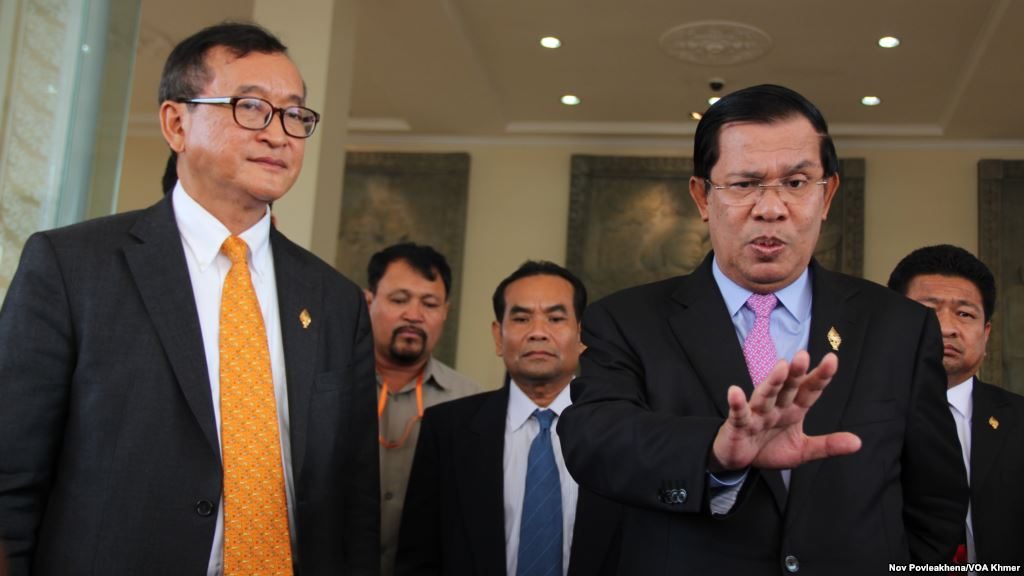Cambodia’s ruling party is seeking to shore up its chances of electoral success with recent changes to the rules governing political parties, Sorpong Peou writes.
Is Cambodia heading towards a single party dictatorship? This is a legitimate question after the Cambodian government took a drastic but unsurprising step in February 2017 to amend the law on political parties – a step that its critics consider undermines liberal democracy. In my view, Cambodia has not resembled any form of liberal democracy since 1997, and the existing hegemonic party system is likely to remain.
If and when it comes into effect, the amended party law will allow the Supreme Court to dissolve any political parties with leaders who have criminal records and to bar such party leaders from standing for political office for five years. Moreover, the new law requires that any party that loses its president find a replacement within 90 days of the King’s signature.
The amended law will also allow the Ministry of Interior to suspend indefinitely any political parties that the government considers to be involved in activities resulting in an “incitement that would lead to national disintegration” and subversion of “liberal multi-party democracy.”
The amendments were designed to ensure that the Cambodian People’s Party (CPP) led by Prime Minister Hun Sen will remain politically dominant, but not to eliminate opposition parties. They were intended to further empower two CPP-dominated state institutions – the Supreme Court and the Ministry of Interior – to prevent opposition parties, especially the Cambodian National Rescue Party (CNRP), from winning enough seats to form a government.
The CPP does not want to see the 1992 or the 2013 national election repeated. It lost the UN-organised election in 1992, but forced the winning party (led by the royalists) to share power, and then removed the royalist prime minister from power by force in July 1997.
The multi-party system has since weakened, giving rise to a hegemonic party system, with the CPP as the dominant power. However, the party was badly shaken by the 2013 election results: it won only 68 seats (compared to the 55 seats gained by the CNRP), leaving it with fewer seats than the previous elections.
After the 2013 election, the CPP leadership did a lot of soul searching and took a number of steps to weaken the CNRP. Opposition politicians have been subject to intimidation and litigation. Sam Rainsy, ex-president of the CNRP and opposition leader (in exile since 2015), has been sentenced to a total of seven years in prison. CNRP vice-president Kem Sokha had been subject to criminal prosecution and sentenced to five months in prison (for not showing up in court for a dubious lawsuit against him) before he received a pardon from the King at Hun Sen’s request.
All this goes to show that the CPP leadership was well aware of the fact that it would not do well in the upcoming commune election in June 2017 and the National Assembly election in 2018 – if the CNRP could have its way. After the July 2016 killing of Kem Ley, a popular political commentator known for his strong criticism of the government, the CPP has become increasingly unpopular with growing public anger directed toward them.
Government officials have confidentially indicated that the CPP is determined not to lose in the upcoming elections and that it would not transfer power to any winning party if it lost. The amendments to the party law were just another step the CPP has taken as part of its pre-emptive measures designed to avoid the repetition of the 1992 and 2013 elections.
Much has been written about the Cambodian culture of impunity as an obstacle to democratic development, but what is still least understood is the fact that the persisting culture driven by the fear of personal retribution (actual or perceived) has been a principal threat to democracy.
It is reasonable to assume that the CPP is not interested in turning the country into a single-party dictatorship, as some commentators think. The ruling party would be happy if it could just maintain a party system that would allow it to remain dominant and secure.
The CPP’s behaviour may also help explain weak reactions from members of the international community, especially donors, some of whom seem to prefer political stability under a CPP leadership to chaotic democratic politics. Others may simply have come to the realisation that there is not much they can do to weaken the CPP’s grip on power.
Over the past several years, CPP leaders have worked harder to deepen their relations with two powerful authoritarian states – Russia and China. China has emerged as Cambodia’s largest donor. Sino-Cambodian relations have grown much tighter in recent years. The harsh reality is that the CPP leadership remains suspicious of Western democracies’ regime-change agendas and wary of any criticisms directed at the human rights situation in Cambodia.
The current global political environment also does not allow democracy in Cambodia to thrive. The looming return of fraught geopolitics (the rise of China, the escalating tension in the South China Sea, the ongoing confrontation between Russia and the West over Crimea and Ukraine), the rise of right-wing forces in Europe and the United States, and the persistence of authoritarianism in Southeast Asia – have all produced negative effects on Cambodian politics.
Dr Sorpong Peou is Full Professor in the Department of Politics and Public Administration at Ryerson University, Canada, and a member of the Yeates School of Graduate Studies.
This article is a collaboration with Policy Forum — Asia and the Pacific’s leading platform for policy analysis and debate.
 Facebook
Facebook  Twitter
Twitter  Soundcloud
Soundcloud  Youtube
Youtube  Rss
Rss 